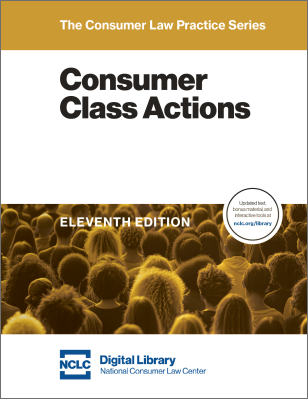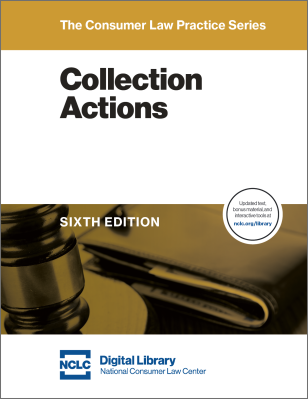The Supreme Court on May 28 ruled in Home Depot U.S.A., Inc. v. Jackson, 2019 WL 2257158 (U.S. May 28, 2019), that a consumer defendant in a collection action can bring class claims against third parties and remain in state court despite the Class Action Fairness Act (CAFA). CAFA, with some exceptions, allows any defendant in a state court class action to remove the case to federal court where the class has at least 100 class members and where the amount in controversy is over $5 million. See NCLC’s Consumer Class Actions § 2.4.2.
Home Depot also has broader implications, suggesting innovative ways that consumer claims can avoid removal to federal court. Where a consumer is a defendant in a state court collection lawsuit, the consumer can stay in state court while bringing class or federal claims against the plaintiff. A consumer defendant in a collection action can also do the same by bringing third parties into the action and raising class or federal claims against those parties.
The Home Depot Holding
In Home Depot, Citibank had brought a state court collection action against a consumer on a debt originating from a Home Depot credit card. The debt arose from the purchase of water treatment systems at inflated prices. The consumer raised an individual counterclaim against Citibank, brought in two other parties—Home Depot and Carolina Water Systems—as counterclaim defendants, and asserted class claims against both of them relating to their sale of water treatment systems.
Home Depot removed the action to federal court under CAFA. But the district court granted the consumer’s motion to remand to state court, and the Fourth Circuit affirmed. Paul Bland of Public Justice successfully argued the case for the consumer at oral argument before the Supreme Court and the consumer was represented on the briefs by Varnell & Warwick PA as well the Public Citizen Litigation Group. NCLC submitted an amicus brief.
Home Depot was decided by an unusual alignment of five justices—the four members of the court’s liberal wing plus Justice Thomas, who wrote the opinion. The key issue in Home Depot was the meaning of the term “defendant” for purposes of two different federal removal statutes. CAFA allows a class action to be removed to federal court by any “defendant.” 28 U.S.C. § 1453(b). The general federal removal statute at 28 U.S.C. § 1441(a) provides that any civil action over which a federal court would have original jurisdiction may be removed to federal court by the defendant or defendants. Does the term defendant in these two statutes refer only to the original defendant sued by the plaintiff, or does it include other third party defendants?
The Court ruled that, while Home Depot could be considered a “defendant” for some purposes, it is not a “defendant” for purposes of CAFA removal and for purposes of the general federal removal statute. The general removal statute only allows removal if there is federal jurisdiction for the plaintiff’s original complaint. In brief, the defendants who can avail themselves of CAFA removal are limited to the original defendants sued by the plaintiff class.
Broad Implications of the Home Depot Holding
Limiting the term defendant for purposes of both CAFA and the general removal statute has broad implications for the ability of a number of different consumer actions to stay in state court. Home Depot reaffirms the Court’s seventy-eight-year-old precedent that a defendant in a state court action can remain in state court despite raising federal counterclaims, such as by raising Fair Debt Collection Practices Act counterclaims. Federal question jurisdiction is based on a federal claim in the complaint, not in the counterclaims. See Shamrock Oil & Gas Corp. v. Sheets, 313 U.S. 100 (1941).
Home Depot extends this holding to third parties that the consumer brings into the action. Consequently, the consumer in a collection action can remain in state court despite bringing federal counterclaims against the plaintiff, and also if she brings in other parties and raises federal claims against those third parties. For example, if a third-party collection agency can be brought into a case in which the creditor is plaintiff, the consumer can remain in state court despite bringing a Fair Debt Collection Practices Act claim against the collection agency.
Home Depot extends the same ability to remain in state court where the consumer brings class counterclaims. If the term “defendant” in the CAFA removal statute does not apply to third parties brought into the action, it certainly does not apply to the plaintiff. Thus CAFA does not apply to class counterclaims brought against the plaintiff. A number of circuit courts reach this conclusion. See NCLC’s Consumer Class Actions § 2.4.4.1. But this is the first time that the Supreme Court has spoken concerning the issue.
Home Depot rules explicitly that a class counterclaim against third parties brought into the case can remain in state court. The Court does not discuss when a defendant in a state court collection case can bring a claim against a third party. Federal Rule of Civil Procedure 14(a) provides that the defendant can serve a complaint on a non-party who is or may be liable to it for all or part of the claim against it. In federal court a third-party claim should be based on the same transaction as underlies the debt being collected.
But Rule 14(a) does not control the standard for a third-party claim brought in state court. The ability to bring such third-party claims will be based on the state’s own procedural rules. If the third-party claim is allowed, then Home Depot indicates that the claim cannot be a basis for removal to federal court.
Of course, all these avenues to keeping a claim in state court rely on the consumer first being sued. But Rule 14(a) does not control the standard for a third-party claim brought in state court. The ability to bring such third-party claims will be based on the state’s own procedural rules.
An NCLC amicus brief submitted to the Court in Home Depot describes at section I.B. a number of situations where class counterclaims have been brought against third parties. But literally millions of collection cases are brought in state court, so this approach to remaining in state court has wide applicability.
Pros and Cons of Raising Claims in State Court vs. in Independent Federal Action
Thanks to Home Depot, consumers who wish to raise class or federal claims have more control now as to whether their claims are raised in federal or state court. If the consumer is sued, the consumer can raise class or federal claims in that case and still stay in state court. Alternatively, class or federal claims can be raised in a separate action, in which case the case will either originate in federal court or likely be removed to federal court.
In deciding which approach to take, there is no hard and fast rule about whether a consumer class or federal claim is better off in federal or state court. Much will depend on the state where the action will be heard and the nature of the case itself. Nevertheless, the following factors among others should be considered in determining whether a claim is better brought in state or federal court:
- A comparison of federal court procedural rules and the state’s procedural rules, including a comparison concerning discovery rules, the admission of expert testimony, and a comparison of Federal Rule 23 and the state class action rules. See NCLC’s Consumer Class Actions Appx. C for a state-by-state analysis of state class action rules.
- A comparison of the backlog of cases in federal and state court.
- A comparison of jury pools in federal and state court.
- The willingness of a state’s federal vs. state court judges to consider consumer claims.
- Whether a state’s federal or state court judges are more receptive to consumer arguments that an arbitration agreement is unenforceable.
- Whether a state court judge is willing to certify a class action as compared to a federal court judge.
- Whether state standards for the award of consumer attorney fees are more or less generous than the federal standards.
- A consideration of both the consumer attorney’s comfort litigating in federal court and that of the opposing counsel.
- Spokeo constitutional standing issues, which apply only in federal court.
- Whether a federal court may refuse to hear certain supplemental state claims.
- Whether personal jurisdiction is more available in federal than state court.
- Whether bringing a counterclaim to an existing state court action may involve fewer fees or bond requirements than bringing an original federal claim.
Other Approaches to Keeping Class Actions in State Court
Where a class action is initiated in state court (as opposed to a class counterclaim or third-party class claim brought in a state court collection action), a number of steps can be taken to keep the class case in state court. One is to avoid federal causes of action. Often federal causes of action have parallel state provisions and remedies, such as a state RICO statute, a state discrimination statute, or a state debt collection statute. State UDAP statutes are another source of state claims that apply to many cases.
Another approach is to bring a number of smaller state-specific class actions instead of one large national action, where each case seeks under $5 million or has fewer than 100 class members. See NCLC’s Consumer Class Actions § 2.6. This will likely be more successful where there is a rational basis to split up consumers into different classes. It will not be successful though to stipulate that any recovery will be under $5 million, no matter the actual damages. See Standard Fire Ins. Co. v. Knowles, 568 U.S. 588 (2013).
Also bear in mind that there are two exceptions—the local controversy exception and the home state exception—to the CAFA removal statute, both of which require that more than two-thirds of the class members are citizens of the state where the action is filed. (The court has discretion to remand the case to state court where the percentage is over one-third.) These two CAFA exceptions can be triggered by defining the class as residents of the state where the action was filed, as of when the action was filed. Issues concerning this manner of defining a class are examined at NCLC’s Consumer Class Actions § 2.4.3.3.2.
If the two-thirds standard is met, then for the local controversy exception to apply, at least one defendant from whom significant relief is sought and whose conduct forms a significant basis for the class claims must be a citizen of the forum state, the principal injuries must have been incurred in the forum state, and no similar class action can have been filed in the last three years. NCLC’s Consumer Class Actions § 2.4.3.3.3.
The home state exception also is dependent on the two-thirds standard being met. It requires the primary defendants to be citizens of the state in which the action is originally filed. NCLC’s Consumer Class Actions § 2.4.3.3.4.
As can be seen from the above, there are other ways to ensure class claims can remain in state court despite CAFA. Nevertheless, Home Depot is important because it shows that consumers can remain in state court even if they bring class claims against either the plaintiff in a state court collection action or against third parties brought into the state court collection action.



